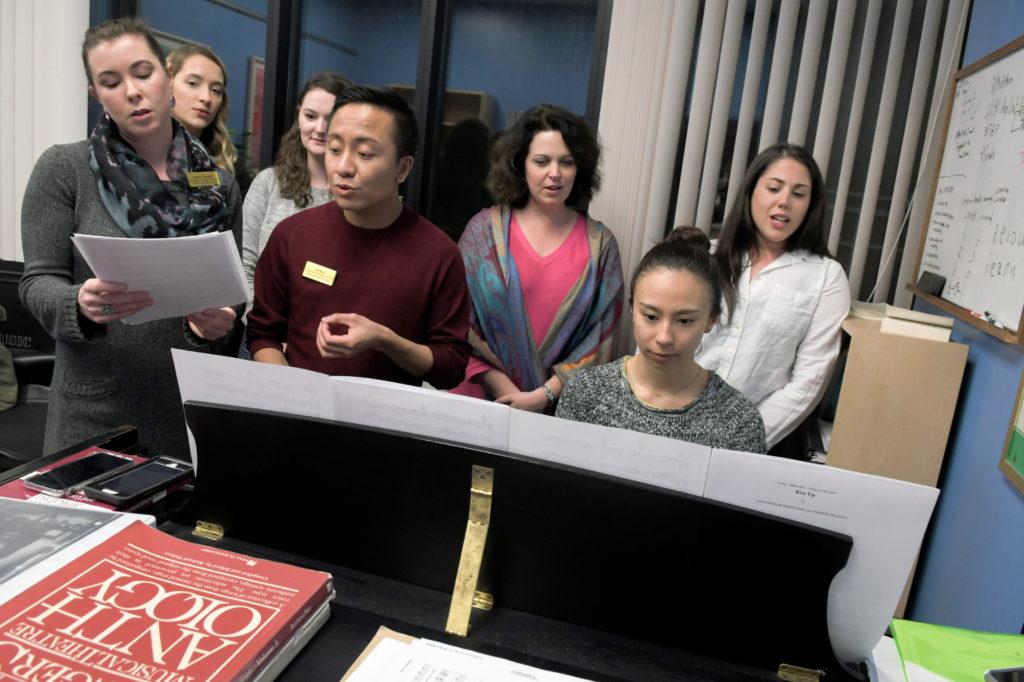Updated: Nov. 12, 2018 at 10:13 a.m.
A new singing group in the Speech and Hearing Center is helping transgender individuals find their “true voice.”
The group, which launched Friday, swaps regimented weekly therapy sessions for a weekly choir group to train participants’ voices and expand their ranges. During the four choir sessions, three graduate students will research whether singing and performing other vocal exercises affect the speech patterns of transgender women or raise participants’ confidence.
Rebecca Goldstein, a student working toward a master’s degree in speech pathology, said she started the group because she wanted to use her background as a professional opera singer to work with the transgender community. During the group meetings, she leads the choir in warmups and guides them through performing songs like “Rise Up” by Andra Day.
“It was really exciting because we opened it to all types of people, any gender non-binary person could come,” Goldstein said. “We had a really nice range of voices which was really exciting, we didn’t know what to expect with that.”
The singing group is comprised of about four vocalists – including transgender men and women – who have never had voice training in a clinical environment.
The center typically offers transitional vocal training, which consists of weekly, hour-long training sessions that can span over six months to two years, but the singing group will attempt to draw out progress in an abbreviated timeframe. The group will meet four times from November to December and use vocal exercises to spark changes to the voice in everyday speech.
While the singers hum, belt and trill up and down their vocal range, the three graduate students record data, and Goldstein hopes the research will show a gradual improvement in the range, control and intonation of participants’ voices.
But more importantly, she said they are assessing how the singers themselves measure comfort and ability with their own voice.
“The biggest thing about the transgender voice, in my opinion, is that their voice matches them because I feel like there’s such a disconnect,” Goldstein said. “The self-ratings are really important, we want to improve the self-ratings as well.”
Adrienne Hancock, an associate professor in the speech and hearing department, is advising the research that Goldstein and two graduate students, Ian Nool and Jessica Thompson, are conducting in the group. Because all three come from musical backgrounds, she said the singing group allows the students to use their expertise to enact change.
“I’m hoping that giving people this space to explore their voice will make them feel a little bit more comfortable with their voice and themselves,” Hancock said. “I like to look at how when someone really finds their true voice, or their comfortable voice, what that does to open up their possibilities for how they express their identity.”
Clients often see slow – but life-changing – results from voice training, allowing women in transition to find the peace they have sought their whole lives, she said.
Dena Barrett, a transgender woman who completed her voice training this summer after two years, said she was able to put a period of her life where she was “so afraid” of opposition behind her and find peace after her vocal training.
Because hormonal changes are slower in older transgender women, Barrett said she still has days where she feels uneasy, but she has developed her “true voice” and is recognized as a woman – both by herself and others around her.
“I started going out and I realized that people were responding to me, and recognizing me as the woman I am instantly, and the voice was a big part of that,” she said.
Aside from the physical change of being able to sustain a more feminine speech pattern, Barrett said she experienced difficulty with the more psychological, “reflexive” roadblocks to finding her voice from years of social conditioning.
“You really need to be patient and determined, and realize it’s not one of those things you can set a schedule on,” Barrett said. “There were times when I was really discouraged and felt like I wasn’t making any progress at all.”
Linda Siegfriedt, who oversees the clinical practice of student-run voice trainings for transgender women in the Speech and Hearing Center, said that a successfully “passing” voice requires pitch elevation and a fuller tone, balancing body and breath in the voice’s upper range. Together these qualities eliminate the need to use a weak falsetto when clients are reaching for their upper register.
She said that since the speech pathology program’s inception in the 1970s, the clientele has gone from predominantly middle age or older transgender women to hosting a number of teenage and college-age participants in the last three to four years. Siegfriedt attributed this to increased visibility of transgender narratives that encourage young people to come out as transgender earlier in life.
“You can be who you are, who you were born to be in your 20s, instead of suffering through your whole lifetime until you get to middle age and you retire, and then being able to live as who you are,” Siegfriedt said. “So I think a life is more satisfying and fuller.”
Being on the younger side makes the transition into a more feminine voice slightly easier, as the body can “learn better,” is more responsive to changes and remembers techniques easier, she said.
Siegfriedt said the transformation within clients is “profound,” and the training lends itself to a “development of one’s soul” rather than strictly a change in voice.
“I have seen clients share with me that they’ve found that they have skills and interests that didn’t come out until they transitioned fully,” she said. “Some people tell me that it’s not just about voice, but it’s about having a voice.”
This post has been updated to reflect the following correction:
The Hatchet incorrectly reported that Adrienne Hancock is a professor. Hancock is an associate professor. We regret this error.




